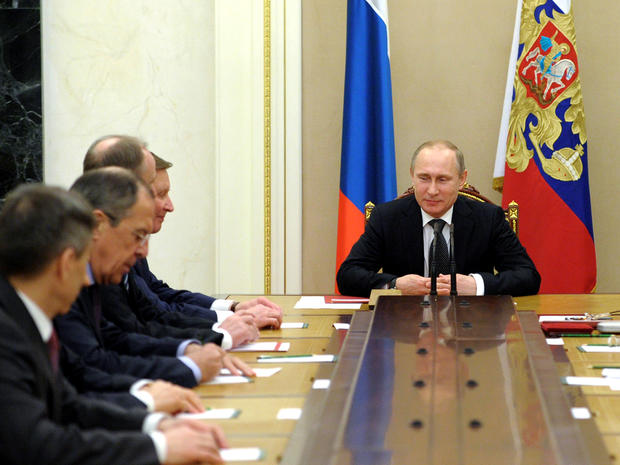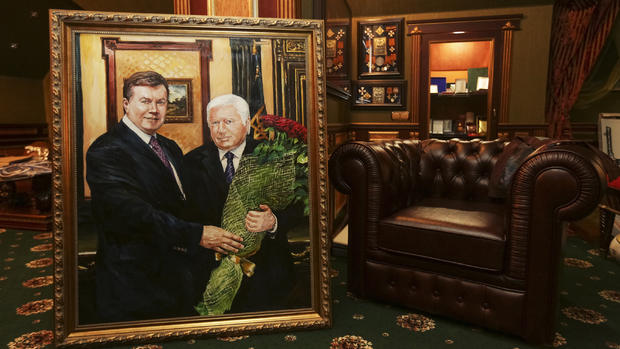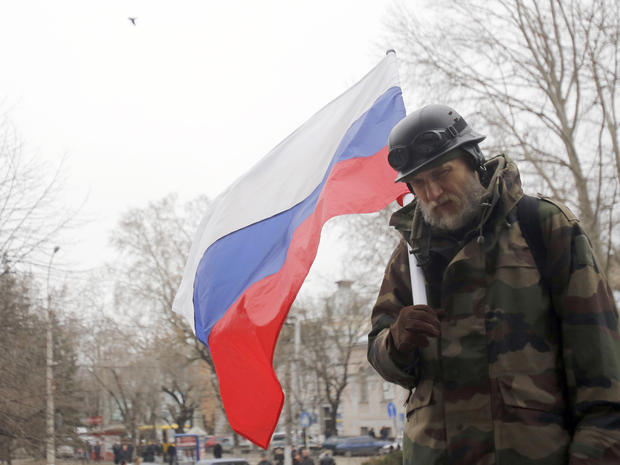Russian President Vladimir Putin puts troops on high alert near Ukraine for war games
SIMFEROPOL, Ukraine - President Vladimir Putin put Russian combat troops on high alert for war games near Ukraine on Wednesday, the Kremlin's boldest gesture yet after days of sabre rattling since its ally Viktor Yanukovich was toppled as president in Kiev.
Moscow said about 150,000 troops would take part in exercises in the Western military district that borders Ukraine, although it denied that the previously unannounced war games were linked to events in its neighbor.
With the political turmoil hammering Ukraine's economy, the hryvnia currency fell 4 percent on Wednesday, with ripples spreading to Russia where the rouble fell to five-year lows and bank shares took a hit.
Ukraine's central bank, which has been rapidly spending its hard currency to protect the hryvnia, said it had abandoned a managed exchange rate in favor of a flexible currency.
Thousands of ethnic Russians, who form the majority in Ukraine's Crimea region, demonstrated for independence. They scuffled with rival demonstrators supporting the new Kiev authorities. The Crimea is home to part of Russia's Black Sea Fleet, which Moscow said it was taking steps to secure.
One person died in the Crimea protest, apparently of a heart attack during a crush of the crowd, Interfax news agency reported. A Reuters correspondent on the scene reported surging crowds and scuffles but no major violence.
NATO defense ministers, meeting in Brussels, issued a statement supporting "Ukrainian sovereignty and independence, territorial integrity, democratic development, and the principle of inviolability of frontiers".
However, their statement made no direct mention of the Russian war games. Britain's Defense Secretary Philip Hammond said London would watch any Russian military activity.
Moscow denounced what it described as the rise of "nationalist and neo-fascist sentiment" in Ukraine's mainly Ukrainian-speaking west, where it said Russian speakers were being deprived of rights.
It has repeatedly expressed concern for the safety of Russian citizens in Ukraine, using language similar to statements that preceded its invasion of Georgia in 2008.
"In accordance with an order from the president of the Russian Federation, forces of the Western Military District were put on alert at 1400 (1000 GMT) today," Interfax news agency quoted Russian Defense Minister Sergei Shoigu as saying.
Shoigu also said Russia was "carefully watching what is happening in Crimea" and taking "measures to guarantee the safety of facilities, infrastructure and arsenals of the Black Sea Fleet," in remarks reported by state news agency RIA.
In the latest of a series of increasingly strident statements, Russia's foreign ministry said Ukrainian extremists were "imposing their will", and a Ukrainian church affiliated with the Moscow-based Russian Orthodox Church had faced threats.
Since Yanukovich's downfall on Saturday, all eyes have been on Putin, who ordered an invasion of neighboring Georgia in 2008 to protect two self-declared independent regions with many ethnic Russians and others holding Russian passports. Moscow recognized the regions as independent states, using armed force effectively to seize control of territory from its neighbor.
Any military action in Ukraine, a country of 46 million people that has close ties with European powers and the United States, would be far more serious - the closest the West and Russia have come to outright confrontation since the Cold War.
The new authorities say they are worried about separatism in Crimea, the only part of Ukraine where the majority is ethnic Russian, although many ethnic Ukrainians in other eastern areas speak Russian as a first language.
The Crimea, a Black Sea peninsula administered as part of Russia until the Soviet authorities transferred it to Ukraine in 1954, has frequently seen separatist tension at times of mistrust between Moscow and Kiev.
Demonstrators poured into the regional capital Simferopol, where the provincial parliament was debating the crisis.
Pro-Russian crowds, some cossacks in silk and lambswool hats, shouted "Crimea is Russian!". More were bussed in, swelling the crowd. Police denied a report by a Russian news agency that there had been an explosion.
Rival demonstrators backing the new authorities - mainly ethnic Tatars repressed under Soviet rule - rallied under a pale blue flag, shouting "Ukraine! Ukraine!"
Ukraine's new leadership plans to name its new cabinet on Wednesday, paving the way for urgent IMF talks to stave off financial meltdown now that Russia is all but certain to cut off a $15 billion lifeline it offered Yanukovich as the prize for turning his back on ties with the EU in November.
The International Monetary Fund has said it is prepared to send a team of negotiators to Kiev, but a government must first be formed there and request the aid. U.S. Deputy Secretary of State William Burns, visiting Kiev, said American financial experts were already in the country looking for ways to help.
Yanukovich fled Kiev on Friday night after days of violence in which scores of his countrymen were killed, including demonstrators shot dead by police snipers from rooftops.
His whereabouts are not known, although the government says it believes he is hiding in Crimea. It wants him tried at the International Criminal Court in the Hague.
On Wednesday the new authorities disbanded the Berkut "Golden Eagle" riot police units blamed by the public for posting sharpshooters on rooftops who killed protesters. Protester self-defense units that have occupied central Kiev were ordered to remove ski masks to be less intimidating.
A street leading to Independence Square where many were killed has been renamed "Avenue of the Glory of the Heavenly Hundred" for those slain. It is now covered with heaps of flowers and candles. Pictures of the dead are nailed to trees.
Ukraine has suffered an identity crisis through two decades of independence. With borders drawn by Bolshevik commissars, it is split between a largely Ukrainian-speaking west, including areas annexed by the Soviets from Austria and Poland, and east that was mainly Russian territory since the middle ages.
However, even in Yanukovich's eastern home region of Donetsk, there was little sign of support for the fugitive leader. His portrait had been taken down at the Donetsk headquarters of his former ruling Party of the Regions, where its leader in the provincial parliament Nikolay Zagoruyko said Yanukovich was to blame for the killings while he was president.
"Of course he is guilty," he said. "He was the president. The guilt for what happened lies with Yanukovich."
The new authorities must salvage the economy of a country near bankruptcy and heavily dependent on Russian gas. Traders in Kiev said the central bank was absent from the hryvnia market, allowing the currency to fall below 10 to the dollar, a record.
Central bank governor Stepan Kubiv said the bank would not intervene to prop up the currency in coming days. Sergiy Kruglyk, the bank's international relations director, said Kiev had "transferred from a fixed, so-called managed exchange rate to the flexible exchange rate."
Acting prosecutor Oleh Makhnytsky announced he had ordered police and intelligence agencies to draw up a list of foreign accounts held by Yanukovich's aides and their connections to search for "not millions, but billions" in stolen assets.
Every economic deal concluded in the four years of Yanukovich's presidency would be carefully re-examined for possible corruption, Makhnytsky said.
The U.S. Treasury warned banks to be on the look-out for suspicious transfers of assets by Yanukovich or his circle.
The hryvnia has lost nearly a fifth of its value since the New Year, more than any other major emerging currency. The further it falls, the harder for Kiev to repay its dollar debt. The cost of a contract to insure Ukraine's debt for five years rose to more than 10 percent per year on Wednesday, meaning traders believe a default is likelier than not.
Oleskander Turchinov, the parliament speaker who assumed the presidential duties after the assembly removed Yanukovich from power on Saturday, took the helm of the armed forces. He is expected to pick a cabinet to be announced late on Wednesday to crowds in Independence Square, crucible of the revolt.
Turchinov is an ally of opposition leader Yulia Tymoshenko, who was freed from jail moments before parliament removed Yanukovich. Tymoshenko, a former prime minister, has said she does not want to return to the job, which could go to economist Arseny Yatsenyuk, who ran her party while she was jailed.


